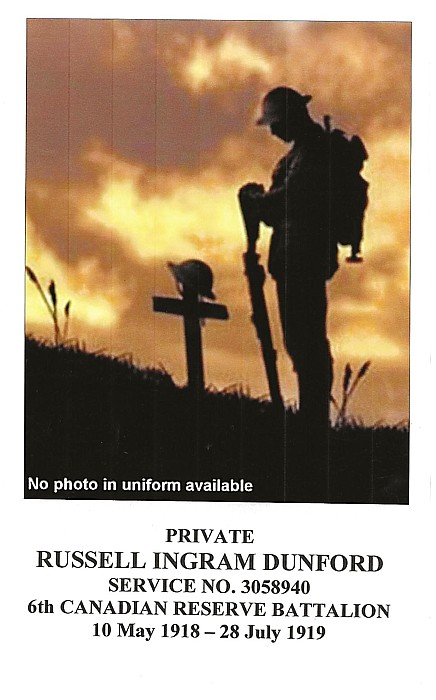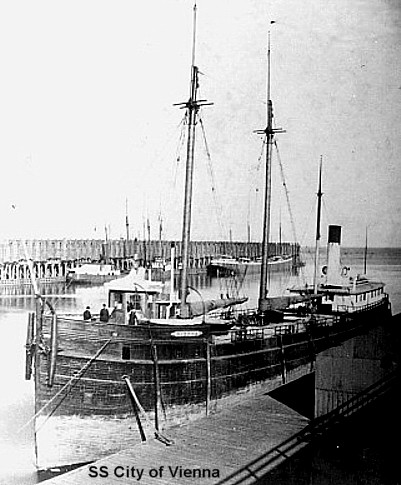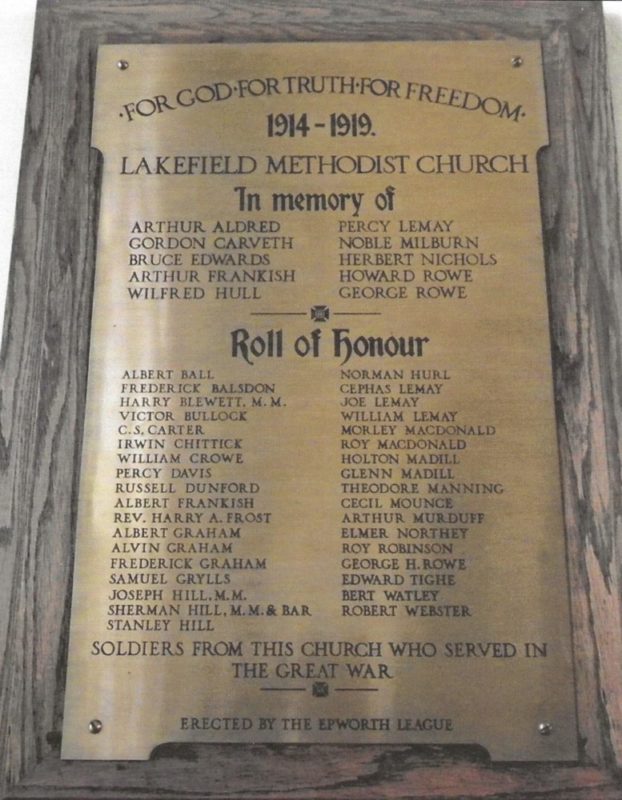
MILITARY HISTORY
Private Russell Ingram Dunford – 3058940 – Active Service (WW I)
On May 10th, 1918, under the provisions of the Military Service Act of 1917 Russell Ingram Dunford was called up (drafted), to the Canadian Expeditionary Force (CEF) at No. 3 District Depot at Kingston, Ontario, for the duration of the War. He was 21 years, 8 months old, and single. Russell Dunford indicated that he was born in Wilberforce, Ontario, and gave his birth date as March 25th, 1896.
There is no reference to where or to what level, he was educated. He indicated that he had no previous Military experience. As far as his Trade or Calling, he lists ”Farmer”. Russell Dunford was 5′ 9 and 1/4” tall, and had a 36” chest (expanded). He had a dark complexion, blue eyes, and brown hair.
His medical examination took place May 10th, 1917 at Peterborough, Ontario. Other than having a scar on the inner left knee, he had no medical issues or physical limitations, and as such he was deemed fit (A2) for Overseas duty with the Canadian Expeditionary Force. His next-of-kin was listed as his father, Mr. William Dunford of RR4, Lakefield, Ontario.
Russell Ingram Dunford signed the Declaration of Recruit in Kingston, Ontario on May 10th, 1918. He was taken-on-strength, as a Private with the 1st Depot Battalion, Eastern Ontario Regiment, CEF, at Camp Barriefield, Kingston, and was assigned Regimental Service Number 3058940.
He was granted a leave from May 11th, 1918 to June 1st, 1918.
The Military File indicates that Private Dunford embarked for England aboard the SS City of Vienna on June 28th, 1918. It shows him re-embarking aboard the SS Thongwa on July 10th, 1918. He arrived in England on July 22nd, 1918. There is no mention of the port of embarkation or disembarkation. He was part of the 47th Draft of the 1st Battalion of the Eastern Ontario Regiment.

On July 22nd, 1918 upon arrival, he was sent to Frensham Pond Camp, where he was taken-on-strength with the 6th Canadian Reserve Battalion. Approximately, the middle of September he arrived at Seaford Camp.
On October 24th, he was reported ill, and was admitted to No. 14 Canadian General Hospital. His illness started with headaches, fever, and pains in limbs. On the following day, he developed a cough, but reported no chest pain. Nose bleed on Saturday evening. Started to spit up yellowish phlegm. Feeling chills. He was reported as ”dangerously ill”, with Influenza and Pneumonia. Spitting up blood.
On November 7th, 1918 was reported as ”no longer dangerously ill”. November 11th, he was once again listed as ”dangerously ill”. November 26th, he was removed from dangerously ill list. On December 30th, 1918 he was transferred and admitted to the Princess Patricia Canadian Red Cross Hospital, Cooden Camp, Bexhill, where he remained until January 21st, 1919 receiving treatment. On January 23rd, he was transferred and admitted to the King’s Canadian Red Cross Special Hospital at Bushy Park, where he was treated for Pulmonary Tuberculosis. He was discharged on February 10th, 1919.
Upon discharge Pte. Dunford was admitted to the Canadian Special Hospital, Lenham, Kent. February 18th, 1919 Pte. Dunford was posted to the E.O.R.D. (Eastern Ontario Regiment Depot, having been boarded (debility – infirm as a result of the lingering effects of Influenza) to Canada. On April 2nd, when he was discharged, and was transferred to the Canadian Convalescent Hospital, at Epsom. On June 29th, he was admitted to the No. 16 Canadian General Hospital, at Orpington, where he remained until he was discharged on July 4th, 1919.
July 6th, 1919 he was taken-on-strength with M Wing CCC (Canadian Concentration Camp) at Witley, England, pending return to Canada.
He was struck-off-strength on embarkation to Canada on July 15th, arriving in Halifax July 24th, 1919. Pte. Dunford was taken-on-strength with the No. 3 District Depot, Kingston, Ontario, and Discharged on July 28th, 1919 as being ”medically unfit for general service”.
The File makes no mention of what Medals, but based on established Military criteria, having not made it to France; he would not have been eligible for any Medals.
Having said that, he should still be considered a casualty of the War.
According to the Military File, Private Russell Ingram Dunford served a total of 1 year, 1 month, and 18 days with the Canadian Expeditionary Force: approximately 1 month in Canada; 1 year and 18 days in the U.K.
An excerpt from an article in Maclean’s by Barbara Ameil, September 1996:
”The Military is the single calling in the world with job specifications that include a commitment to die for your nation. What could be more honourable”.
PERSONAL HISTORY
RUSSELL INGRAM DUNFORD
Russell Ingram Dunford was born in Wilberforce, Ontario on March 25, 1896, son of William John Dunford and Susan Margaret ‘Maggie’ Ingram and brother of five brothers and two sisters. He received his education in the area and worked on the family farm. In 1901, the family had moved to Monmouth in Burleigh Township. By 1911 the family was living on a farm in Douro Township with Russell helping on the farm. In May of 1913 Russell went to Barriesfield Village near Kingston and enlisted to serve King and Country.
After returning home, Russell married Beatrice May Milburn in Peterborough on November 1, 1923. Beatrice was born in Smith Township on May 26, 1894, the daughter of George Milburn and Elizabeth Clark. At the time of their marriage Russell was living and working in Long Beach, Ontario, a former municipality southwest of Toronto. He was a barber by trade. Sadly they only had one child, a baby boy born stillborn on September 29, 1929. We do not know when Russell and Beatrice died or where they are buried.
Russell Ingram Dunford was a member of the Lakefield Methodist Church and is included on a Memorial Plaque which remembers with honour their members who served in the Armed Forces during World War I. This plaque hangs in the Sanctuary of the Lakefield United Church on Regent Street.
THE FAMILY OF RUSSELL INGRAM DUNFORD
Russell’s paternal great grandparents were John Dunford and Mary Ann Payne.
Russell’s paternal grandparents were Richard G. Dunford and Mary Ann Hamblin. They resided in the Wilberforce area and later moved down to Douro Township, Peterborough County to farm.
They were married in Dummer Township on August 27, 1860 and had a family of thirteen children – William, Albert, George, Mary, Ada, Joseph, Frederick, Richard, Margaret, Martha, Malissia, Marslingier and Louise Dunford.
Russell’s maternal grandparents were James Ingram born in 1832 and Cecilia Christie born in 1836. They resided at Lot 23 Concession 4 in Douro Township and had a family of 8 children – Mary Jane, Betsy Christie, Susan Margaret “Maggie”,, Henry James “Harry”, Sarah A., Cecilia E., Charlotte “Lottie” and Mira J. Ingram. James was a farmer and died on February 14, 1889. Cecilia passed away on February 22, 1901; both are buried in Lakefield Cemetery.
Russell’s parents were William John Dunford born in 1860 and Susan Margaret ‘Maggie’ Ingram born in 1864. They married and settled in the Haliburton area. William was a farmer and by 1901 the family had moved down to Burleigh Township to farm. They had a family of eight children – Oscar James, Henry ‘Harold’ John, Wellington ‘Wellie’ William, Stanley ‘Truman’, Stephen ‘Bruce’, Russell Ingram, Cecilia Ellen and Susan M. Dunford. William’s wife ‘Maggie died in 1900 the same year their youngest child was born.
William John Dunford later married Margaret “Maggie” Aline MaGuire and they moved to Douro Township to farm and raise William’s young family. William & Maggie had one child – Mary ‘Ora’ Gladys Dunford. Maggie passed away on July 9, 1951 and William died on May 9, 1956; both are buried in Lakefield Cemetery.
